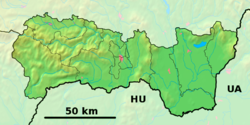Sečovce
You can help expand this article with text translated from the corresponding article in Slovak. (February 2024) Click [show] for important translation instructions.
|
Sečovce | |
|---|---|
Town | |
 Sečovce Town Hall | |
| Coordinates: 48°42′09″N 21°39′24″E / 48.70250°N 21.65667°E | |
| Country | |
| Region | Košice |
| District | Trebišov |
| First mentioned | 1255 |
| Area | |
• Total | 32.66 km2 (12.61 sq mi) |
| Elevation | 136[2] m (446[2] ft) |
| Population (2022-12-31)[3] | |
• Total | 8,524 |
| • Density | 260/km2 (680/sq mi) |
| Time zone | UTC+1 (CET) |
| • Summer (DST) | UTC+2 (CEST) |
| Postal code | 078 01[2] |
| Area code | +421 56[2] |
| Car plate | TV |
| Website | www.secovce.sk |
Sečovce (Slovak pronunciation: [ˈsetʂɔwtse]; Hungarian: Gálszécs;[4] Ukrainian: Сечівці)[5] is a town in the Trebišov District in the Košice Region of south-eastern Slovakia.
History
[edit]
The town was first mentioned in year 1255 on the list of king Béla IV of Hungary. In 1494, a Roman Catholic church was built in the Gothic architecture style. Since the 15th century, there was gradual development of trade, including markets with shoemakers, saddlers, potters and furriers. The first post-office was opened in 1783, telegraph office in 1868, telephone office in 1890, train station in 1904, and museum in 1954, which was moved to Trebišov in 1981.
Geography
[edit]The town lies at an altitude of 149 metres (489 ft), which rises to 177 metres (581 ft) on Albínovská hora. It covers an area of 32.658 km2 (12.609 sq mi) and has a population of about 8,000.
Demographics
[edit]| Year | Pop. | ±% |
|---|---|---|
| 1970 | 5,776 | — |
| 1980 | 6,145 | +6.4% |
| 1991 | 6,705 | +9.1% |
| 2001 | 7,819 | +16.6% |
| 2011 | 8,236 | +5.3% |
| 2021 | 8,526 | +3.5% |
| Source: Censuses[6][7] | ||
According to the 2001 census, it had 7,819 inhabitants - 95.89% of whom were Slovak, 2.17% Roma, 0.47% Czech, and 0.22% Hungarian.[8] The religious makeup was 47.05% Roman Catholic, 25.71% Greek Catholic, 18.11% with no religious affiliation, and 1.83% Lutheran.[8] Prior to 1945, the town had a large Jewish population, most of which was deported by the Nazis. Also, prior to 1945, the town consisted primarily of ethnic Hungarians, with a small Slovak minority, but the Hungarians were forceably deported right after the war in order to ethnically cleanse the area and to make room for Slovaks from the north. Those who remained have assimilated and now consider themselves for the most part to be Slovak.
Economy and facilities
[edit]
The town has a pharmacy, and outpatient health facilities of a general practitioner and pediatrician. There is a public library, a cultural house and a movie theater. It also has a post office, a petrol station, a repair garage, and a number of general and food stores. It also has a Slovak commercial bank and insurance company.
A few factories reside in and around Sečovce - Palma Agro (vegetable oils), Silometal (metal silos and containers), Sonap (clothing), Valter (socks), Lesy SR (wood processing), and Simkovic-Protektor s.r.o./SPR Retreading Solutions (tire retreads)
Sport
[edit]The town has a football pitch, a gym, fitness and a sport hall.
Famous people
[edit]- Štefan Sečovský (16th century), evangelical preacher, writer, composer, pedagogue His original Hungarian name was Galszecsi Istvan.
- Štefan Gáboréczy (16th century), evangelical writer
- Andrej Fáy (1786 – 1864), lawyer, businessman, politician, writer, playwright
- Emery Roth (1871 – 1948), architect
- Herman Jarkovský (1898 – ?), photographer, businessman, musician (violin and cello), music teacher
- Július Muľarský (1910), politician (KSČ), warrior against fascism
- Ján Murín (1913 – 1990), theologian, Byzantine Catholic priest, religious activist, warrior against communism, victim of communism
- Ján Bavorský (1918), lawyer, university professor
- Štefan Korčmároš (1919 – 1985), historian, chronicler, writer, pedagogue, cultural activist
- Vojtech Jenčík (1920 – 1976), theologian, priest, poet, warrior against communism, victim of communism
- Jozef Švagrovský (1921 – 1985), paleontologist, university professor
- Andrej Mikloš (1924 – 2002), economist, cultural activist
- Gejza Šimanský (1924 – 2007), football player
- Mikuláš Kasarda (1925-2013), poet, pedagogue
- Dionýz Čollak (1926 – 2004), veterinary surgeon, university professor
- Ingrid Lukáčová (1969), poet
- Michal Besterci (1937), metallurgy engineer, university professor
- Ingrid Timková (1967), actress and director
- Adolf Schwarz (1836), Hungarian-Jewish chess player
- Ivan Rác (2013), Slovak-Brazilian A.K.A. Gypsy low budget spiderman
References
[edit]- ^ Statistical Office of the Slovak Republic (www.statistics.sk). "Hustota obyvateľstva - obce". www.statistics.sk. Retrieved 2024-02-08.
- ^ a b c d "Základná charakteristika". www.statistics.sk (in Slovak). Statistical Office of the Slovak Republic. 2015-04-17. Retrieved 2022-03-31.
- ^ Statistical Office of the Slovak Republic (www.statistics.sk). "Počet obyvateľov podľa pohlavia - obce (ročne)". www.statistics.sk. Retrieved 2024-02-08.
- ^ "Gálszécs". Magyar nagylexikon (in Hungarian). Vol. 8. kötet (Ff – Gyep). Budapest: Magyar Nagylexikon Kiadó. 1999. p. 452. ISBN 9638577398.
- ^ "Naukovyĭ zbirnyk Muzei͡u ukraïnsʹkoï kulʹtury u Svydnyku : Annales Musei culturae ukrainiensis Svidnik" (in Ukrainian). 2. Bratyslava: Slovenské pedagogické nakladateľstvo. 1999: 50–51. OCLC 5065203.
{{cite journal}}: Cite journal requires|journal=(help) - ^ "Statistical lexikon of municipalities 1970-2011" (PDF) (in Slovak).
- ^ "Census 2021 - Population - Basic results". Statistical Office of the Slovak Republic. 2021-01-01.
- ^ a b "Municipal Statistics". Statistical Office of the Slovak republic. Archived from the original on 2008-02-08. Retrieved 2008-02-09.




